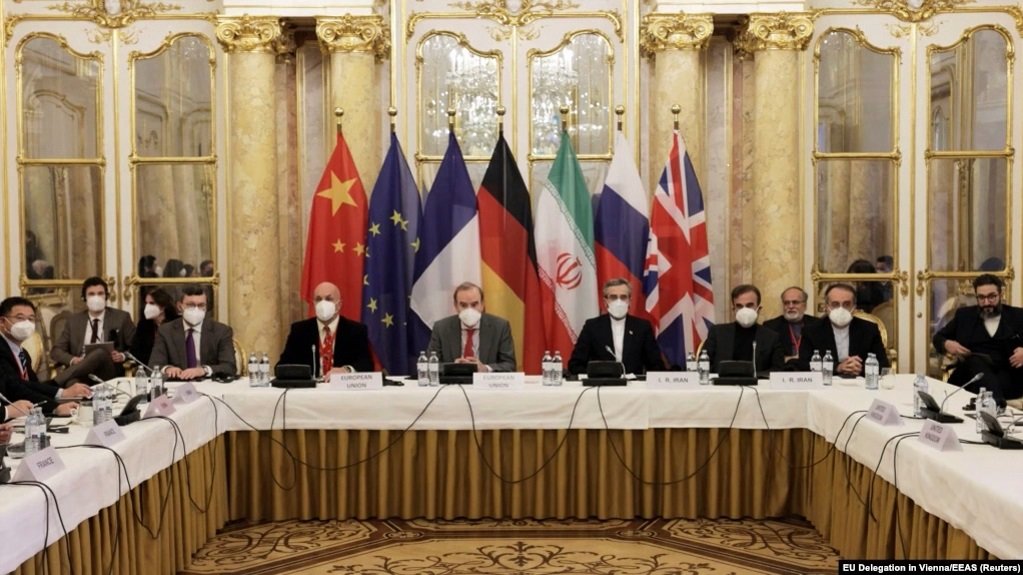Updates on New Iranian Nuclear Deal Negotiations
EU Diplomats sit at the negotiation table in Vienna, Austria. Source for Photo: rferl.org
The Joint Comprehensive Plan of Action (JCPOA), also known as the Iranian Nuclear Deal, was initially established by President Obama in 2015, with the United States and China, France, Germany, Russia, the United Kingdom, and Iran as parties to the accord. The deal’s purpose was the Iranian development of nuclear weapons achieved by reducing global sanctions on Iran. Sanction relief allowed the Iranian economy increased access to world markets, and, in exchange, Iran did not pursue nuclear development and had to dismantle existing nuclear programs.
The deal was extremely controversial from its introduction, as opponents of the deal believed it lacked the enforcement mechanisms to prevent Iranian nuclear development, which they claimed continued to occur in silence after the deal. Despite this, President Obama established the deal, although he left sanctions unrelated to the nuclear program in-place. The deal was largely considered to have reduced the pace of Iranian nuclear development, but this assertion was never accepted by the majority of the US Republican Party. President Donald Trump and other prominent Republicans claimed the deal did nothing to prevent Iranian nuclear development, was “a horrible, one-sided deal,” and promised to withdraw from it during their 2016 campaigns. President Donald Trump unilaterally withdrew from the deal in 2018, and reestablished severe sanctions towards Iran, crippling the Iranian economy. Shortly after the US withdrawal, Iran began to violate the terms of the JCPOA, openly developing its nuclear program by enriching Uranium past acceptable levels. President Joe Biden campaigned on re-establishing the Iranian Nuclear Deal and dismantling Iran’s nuclear weapons program. Discussions about re-establishing US involvement in the JCPOA under new terms began in April 2021.
One year later, the discussions remain ongoing, yet the potential for a deal is in doubt. Russia is a vital party to the Iranian Nuclear Deal, but their invasion of Ukraine has cast a cloud over the negotiations. Several US Congresspeople have spoken out against any sort of negotiation involving Russia, claiming it to be inappropriate due to Russia’s war in Ukraine. Furthermore, due to the sanctions Russia has incurred for their invasion of Ukraine, Moscow requested that all trade between Russia and Iran must be protected from any sanctions. The United States has categorically refused these terms. The US has firmly stated that the Nuclear Deal will not provide an “escape hatch” from sanctions for Russia. Despite this, Russia claims it received private guarantees from the US that these terms were feasible. The US denies this, and special envoy Robert Malley states that he is not confident in a deal and talks have stalled.
In contrast, Iranian negotiators have been overwhelmingly confident about the prospects of a new deal, claiming that it is imminent. Iranian and Russian diplomats have claimed that there are no major obstacles in the way of a deal, and that the United States is at fault for any delays, saying that the United States must make some decisions. Unsurprisingly, the United States has claimed that decisions must be made by Iran and Russia for talks to proceed.
European Union diplomat Josep Borrell, who has been an integral part of negotiations since they began, believes that an agreement is near. However, the Foreign Terrorist Organization (FTO) designation of the Iranian Revolutionary Guards has proven to be major sticking point. Iran demands that the designation be removed, claiming that the Guards are a national army and thus cannot be sanctioned. The United States is hesitant to remove the designation due to the Guards’ links to state-sponsored terrorism, particularly with Hezbollah. Still, Special Envoy Robert Malley suggested that the designation is merely a symbolic gesture, and even if removed, the Guards will be heavily sanctioned. This position has upset several US regional allies. Israel and several Gulf States have stated that the Guard’s FTO designation must not be removed.
The Nuclear Deal would allow global oil markets to access Iranian petroleum, which would stabilize the world oil market and reduce the price of gasoline. The United States has stated that this is not a factor in its negotiations, and they are not willing to compromise due to concerns over petroleum costs.
Additionally, Iran seeks to strengthen the new deal’s staying power by adding a provision to lock in future American presidents to the deal in order to avoid a repeat of President Trump’s unilateral withdrawal. This proposition has proven deeply unpopular in the US Congress, where the Nuclear Deal was already seen as a political landmine. Democratic politicians are hesitant to support the Nuclear Deal, which is seen as politically unpopular, this close to the November midterm elections. Despite these objections, political observers have largely stated that the potential for a deal rests solely on the will of President Biden. The White House will likely be unable to find the sixty Senate votes necessary to establish a permanent treaty. However, President Biden can establish a new Nuclear Deal via executive order, following how President Obama established the original 2015 deal. The Senate would not be able to corral the necessary two-thirds majority to reject a president veto, and could not stop the President from establishing a new Nuclear Deal in this manner.

